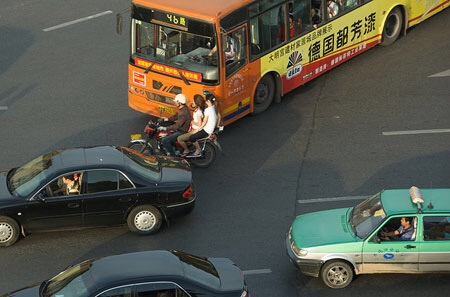A Foreigner’s Guide to Buying Vehicles in China
Publish Date:2018-12-13 Clicks:1925

Jun 08, 2017 By Danielle Martin , eChinacities.com
So you’ve finally had it with negotiating the daily, painfully slow, cramped bus journey. Or maybe you prefer taxis when it comes to public transport, but now even these are fraught with difficulty given the introduction of the new taxi-hailing apps such as Kuaidi Dache (快的打车) and Didi Dache (嘀嘀打车). Life just got so much more difficult standing on the side of the road trying to flag a cab. You see them sailing by with their lights on green, heading elsewhere to pick up a pre-agreed fare.
Whatever your reason, you’ve decided to take the plunge and buy a vehicle, joining the throngs of Chinese in the daily rat race. But where to start? What do you buy and how do you buy it? Are you even allowed to buy a vehicle as a foreigner in China? Let’s take a look and find out.
1) E-Bikes
These are by far the most convenient way of travelling around the populated cities of China at a relatively quick pace. The rules on e-bikes (the ‘e’ stands for ‘electric’) are very lax and rarely enforced. However the traffic police do attempt to enforce them from time to time by maintaining a presence at busy junctions during rush hour traffic and stopping riders who are blatantly flouting them.
Foreigners in China are allowed to buy and ride e-bikes, and having a licence isn’t necessary. As one Chinese friend recently told me, “You can legally ride an e-bike at 18 years old and there is no test to pass or licence to obtain. Just take your money to the shop and buy a bike.” That explains the downright dangerous driving I see each day, then!
Registering a newly-purchased bike is a bit of a grey area. When you buy your bike, the store may offer to help you in taking the documents to the police station and registering the licence plate of your bike. Most people don’t bother though as it’s not something the police are concerned about. Given the obscenely high number of e-bikes on the road, if your bike is stolen it is impossible to trace or recover it (they don’t come with tracking devices) even if it is registered, so most people don't bother.
One rule that is moderately enforced is that pillion passengers are in fact illegal, anyone caught carrying one can incur an on-the-spot RMB 20 fine. Due to this ridiculously low penalty, most people are happy to offend repeatedly. The only people legally allowed to ride as a passenger on an e-bike are children under the age of 12. A friend of mine once encountered a policeman enforcing this rule and asked him why then does an e-bike have two seats? His reply: “Just because it has two seats doesn’t mean you can use them!”
Another tip: It has been brought to my attention a couple of times by Chinese friends that when buying an e-bike, the seller may ask for your address for "proof of purchase reasons". You are not obligated to hand this over. Only the police station requires your address if you decide to register the bike. Apparently, this has become a means for the more unscrupulous sellers to find out where you live, go to your house and steal the bike back. Be careful and keep your wits about you.
2) Cars
Where previously foreigners who couldn't read Chinese basically couldn't drive cars in China, now it is possible. The bravest amongst us who actually want to undertake this scary endeavour can obtain a Chinese driving licence, if they feel so inclined.
Firstly, it’s important to point out that you can’t drive with an International Driver's Permit (IDP) in mainland China. China has not signed the convention which created IDPs. Also, Hong Kong, Macau and Taiwan issued licenses are not considered Chinese licenses.
If you DO have a driving licence from your own country you don’t need to take the Chinese practical driving test. You simply need to take the Chinese Theory Test which now comes in a variety of different languages. It consists of 100 multiple choice questions, 90 of which must be answered correctly to achieve the pass mark of 90%. If you fail the first time, you can sit it again a second time for free. If you fail it the second time, you must re-register and pay to take the test again.
Please note, these are the rules as defined by the PRC but they may vary from place to place. In some instances a foreigner may be required to take a practical driving test as well as the theory test, even if they already have a licence from their home country.
3) Motorcycles
The rules governing motorbikes are not the same as e-bikes since they are gas powered and far faster. They are therefore licenced in the same way as cars. For a motorcycle to be legal it must be registered with a license plate, you must have insurance and you must have a Chinese motorcycle licence.
The exact rules and regulations will depend on which city you live in. For example, in Hangzhou gas powered motorcycles are illegal and will be impounded by the police if you are caught riding one, even if you have all of the necessary documentation and it is correctly registered elsewhere. You'll also be hit with a RMB 150 fine, which will go up significantly if you don't have the necessary documentation.
4) Bicycles
Owning a bicycle is by far the cheapest, easiest and safest option on this list. You can buy these new from shops or secondhand using the classified section of your local English language magazine. However, if you don’t want to purchase one, most cities have public bicycle schemes whereby you can hire a bike using a smartphone app and jettison it when you're finished.
Happy traveling!
